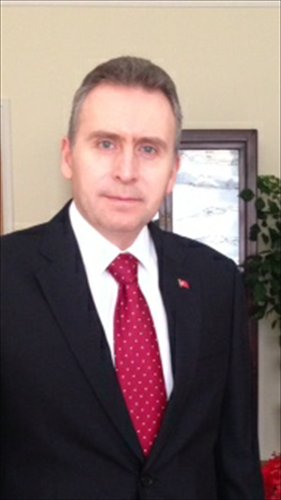G20 offers chance to reboost global economy

Ali Murat Ersoy Photo: Courtesy of Turkish embassy
Editor's Note:
The G20 Summit this year rolled out under the shadow of the terror attacks in Paris. How will the G20 under Turkish presidency boost the growth of global economy? What will the G20 do to combat terrorism? How will the Sino-Turkish relationship evolve? Global Times (GT) reporter Liu Jianxi talked to Turkish Ambassador to China Ali Murat Ersoy (Ersoy) on these issues.
GT: This year's G20 summit took place against the background of a global economy still struggling to recover. How will the summit address this issue?
Ersoy: The G20 is an important platform for discussing global economic and financial issues. It represents about two-thirds of global population, 85 percent of global GDP and over 75 percent of world trade.
Turkey's G20 presidency aims to enable inclusive and robust global growth through collective action. To this end, our G20 priorities are formulated as the three Is: inclusiveness, implementation and investments.
When we announced our presidency, we placed "inclusive growth" at the heart of our agenda. Quality of growth is also very important. Growth should be balanced and sustainable. Its employment generation capacity is similarly a critical element.
Inclusiveness deals with both the domestic and international aspects of the term. It is a major factor when we think in terms of the quality of growth. Since the global crisis of 2007-08, the growth has been problematic in terms of quantity. However, there have been even larger problems on the quality side. This was also valid for the advanced economies.
When we talk about a country's inclusive growth, we can talk about unemployment, poverty, income distribution, education, healthcare and so forth. With regard to international inclusiveness, it is clear that our decisions and actions should also benefit non-G20 countries. We should be committed to building a better global dialogue. Therefore, low income developing countries are a particularly important focus for our presidency. We also prioritized issues such as food security and energy access.
The second I is about implementation. G20 members have committed to lifting our collective economic growth by an additional 2.1 percent over the next five years. This will bring an additional $2 trillion to the world economy. Therefore, implementation of our commitments is vital.
The third is about investments. This is a critical item both for lifting the global growth potential and for generating new jobs. The Turkish presidency proposal for G20 countries to prepare concrete and ambitious national investment strategies to support their national growth strategies has received broad support from the members. Investment strategies should be country-owned and country-led.
They should include measures to attract long-term institutional investors, enhance public-private partnerships, promote improved access to finance by SMEs, improve the regulatory framework, improve efficiency of public investment and support alternative sources of infrastructure investment such as asset-based financing.
In brief, the Antalya summit will address the global economic concerns through common action and deliver strong results in line with the priorities of the Turkish presidency and in compliance with the determination and contribution of previous presidencies.
GT: Terrorism is increasingly a concern for Turkey. What is Turkey's anti-terrorism policy?
Ersoy: Terrorism is a global problem. Turkey has been fighting terrorism for a long time. Turkey condemns all forms of terrorism and believes that the fight against terrorism necessitates cooperation and coordination among all. We are actively engaged in bilateral, regional and international fora to fight this menace. We are ready to work together with all countries who are seeking our cooperation.
If we want to be more relevant for our own societies and also reach out to other segments of the world population, the G20 should deal with some urgent matters in a broader context. It is an informal political forum. However, it can also deal with major problems directly affecting development and growth not only in quantity but also in quality.
Terrorism is a major problem. It affects the quality of life for all. It hampers development. It creates incredible economic and social burden on countries. It has to be dealt with.
There are well established channels and mechanisms between Turkey and China on security related matters. They are strong, clear and multilayered. Our cooperation will continue.
GT: Xi visited Turkey while attending the G20 summit. What were the highlights of his visit?
Ersoy: It was a very important visit. This is Xi's second visit to Turkey (the first took place when he was vice president), but his first visit as president of China. It is on the occasion of the G20 summit, but there has been an extensive bilateral agenda. Our leaders have had a comprehensive meeting and several new agreements have been signed between the two countries.
This is a significant stage of the Sino-Turkish relationship. Cooperation on the "One Belt, One Road" initiative and mutual determination to improve the relations have been strongly underlined.
Turkey has set the goal to reach a higher level of development by 2023, the 100th anniversary of the foundation of the republic. China has the dual centenary goals. We closely follow your country's work toward the "Chinese dream."
Turkey also has a dream and a clear objective to become one of the top 10 economies in the world by 2023. G20 work and achievements will play a significant role for us to reach our targets.
GT: Sino-Turkish relations have been upset by certain anti-China nationalist sentiments. How is the situation now?
Ersoy: There is no anti-China nationalist sentiment in Turkey. In fact, this year Turkey welcomed more than a quarter million Chinese citizens as tourists. If anyone upsets the public peace and security in Turkey, the relevant authorities will deal with them. Our president's statements before his visit to China in this past summer clarified the situation.